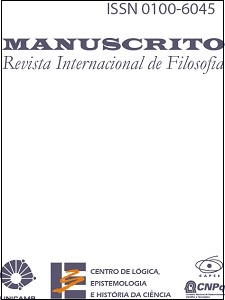Resumen
En este trabajo analizaremos algunos aspectos involucrados en el concepto de demostración matemática. Comenzaremos con la descripción de Enderton, sobre los requisitos que una demostración debe cumplir, estas son convicción final, finitud y verificabilidad algorítmica, para luego analizar las objeciones que Chateaubriand hace al respecto, y señalar algunas discrepancias con sus planteos. Estas discrepancias no pretenden apoyar la perspectiva de Enderton. En una segunda instancia, procuraremos observar algunas dificultades que surgen, cuando queremos determinar lo que es una demostración. Si bien el concepto de demostración puede ser analizado desde diversas perspectivas, teniendo en cuenta sus múltiples dimensiones, por ejemplo su dimensión retórica, ontológica, me concentrare fundamentalmente en su aspecto epistémico.
Abstract:
In this paper I analyze some aspects involved in the concept of mathematical proof. I begin with Enderton’s description of the requirements that a proof must fulfill, namely, a final conviction, finitude and algorithmic verifiability, and then analyze the objections that Chateaubriand raises on this topic, and indicate some discrepancies in his exposition. These discrepancies are not meant as an argument for Enderton’s perspective. Although the concept of proof can be analyzed from different perspectives, i.e., taking into account its several different dimensions, for example its rhetorical, ontological dimension, I will concentrate fundamentally on its epistemic dimension.
Keywords: Proof. Conviction. Finitude. Verifiability. Formal.
Citas
CHATEAUBRIAND, O. Logical Forms. Part II: Logic, Language and Knowledge. Campinas: UNICAMP, 2005. (Coleção CLE, v. 42, pp. 282-289) ENDERTON, H. B. A Mathematical Introduction to Logic. Academic Press, 1972.
GRIMALDI, R. P. Matemáticas discreta y combinatoria. Wilmington, Delaware: Addison-Wesley Iberoamericana, 1997. (Tercera edición) SEOANE, J. “The Concept of Mathematical Elucidation: theory and problems”. CLE e-prints (Section Logic), vol. 6, n. 4, pp. 1- 21, 2006.
VAN STIGT, W. P. Brouwer’s Intuitionism. Amsterdam: Elsevier Science Publishers B.V., 1990.

